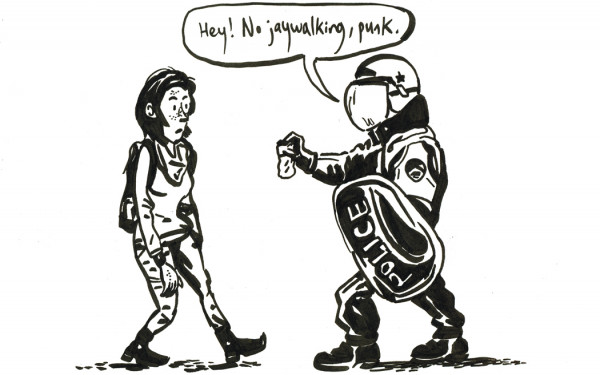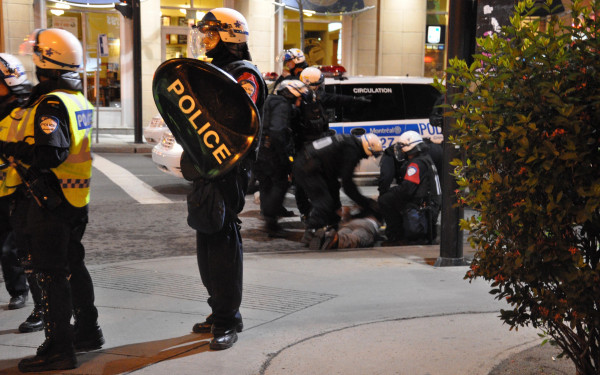May Day Protest Ends in Mass Arrests
Thwarted Demo Links Labour and Anti-Capitalist Issues
Montreal’s May Day protest was nearly over before it began, with roughly 300 people detained and ticketed in the the city’s Old Port Wednesday afternoon.
Organized by the Anti-Capitalist Convergence, the protest gathered at Place Jacques-Cartier, right outside Montreal City Hall to protest capitalism, corruption and labour issues.
Wednesday’s demonstration was intended to centre around the Le 357c—a private club that has recently come up in the Charbonneau Commission and, according to the CLAC, is where “the capitalists draw up the plans of our oppression and our exploitation.”
The protest never made it to the club.
As someone over a megaphone called for the march to begin, Montreal police in riot gear moved in and split the group, causing small clashes between police and groups of protesters still trying to remain in the streets.
Paint and water balloons were thrown at a line of riot police and a small scuffle ensued. The police soon announced that the protest had been declared illegal under municipal bylaw P-6 as well as due to criminal acts being committed.
A tweet from the Montreal police later claimed that sticks were used to hit officers and that billiard balls had been thrown at them.
After a short march west down several blocks of de la Commune St., the police forcibly corralled and kettled approximately 300 people. Others were targeted and arrested before and after the kettling.
Pepper spray and sound grenades were used by the police during the protest.
Other demonstrations were organized throughout the city to mark May Day. The day is also known as the international worker’s day and is celebrated annually to commemorate or demonstrate for labour issues and workers rights.
Two protests converged on Montreal’s Old Port mid-afternoon on Wednesday, according to Montreal police. Demonstrators included workers from the umbrella union group Confédération des Syndicats Nationaux, which is asking for unionization among employees of the Couche-Tard convenience store franchise.
A representative from the CSN also sat down with Quebec premier Pauline Marois, along with representatives from the Quebec Labour Federation and the Central Union of Quebec—the two other major provincial labour unions—to discuss the unions’ concerns with Bill C-14, a proposed language law amendment to further protect the French language in the province.
A Non-Migrating Struggle
While proponents argue worker’s rights for collective bargaining and fair wages are being threatened worldwide, immigrant labour organizations say the rights of migrant workers are being disproportionately ignored.
According to a press release by the Immigrant Workers Centre in Montreal, migrant and temporary agency workers are upset with changes to the federal Low Skilled Temporary Foreign Workers Program, announced this week in response to RBC’s hiring of foreign workers to replace 45 Canadian-held positions at the bank.
They say the changes will discourage migrant worker employment in Canada.
“We are not asking for anything but a minimum of respect for our rights as temporary migrant workers,” said Mohammad, a temporary worker in New Brunswick whose last name was omitted in a statement released by the IWC.
They are also demanding minimum wage be increased to the “liveable” sum of $12 per hour.
According to Emma Smith, spokesperson for the Montreal chapter of CLAC, the struggle of migrant workers is closely tied to the anti-capitalist cause.
“One cannot exist without the other; they are intimately tied and linked there is no difference between one struggle and the other,” Smith told The Link.
“I think it’s important for people not to ever allow their basic civil freedoms to be taken away so easily, particularly when the political elites are the corrupt in all this, not the people,” she added.
CLAC has organized multiple demonstrations in Montreal over the past few months, primarily to denounce the municipal bylaw P-6, which the organization says is illegally restricting rights to free expression and assembly.
In amendments last year, the bylaw was expanded to grant police powers to declare protests illegal if no route is provided to police within 24 hours of any demonstration on public land.
Protesters are also prohibited from concealing their faces, whether it be with bandanas or panda heads.

2web_900_598_90.jpg)
3web_900_598_90.jpg)
4web_900_598_90.jpg)
5web_900_598_90.jpg)


1_600_375_90_s_c1.jpg)

_600_375_90_s_c1.jpg)
